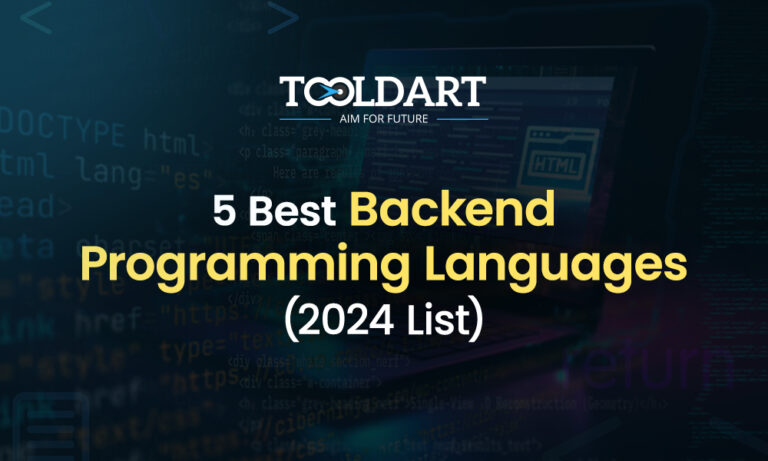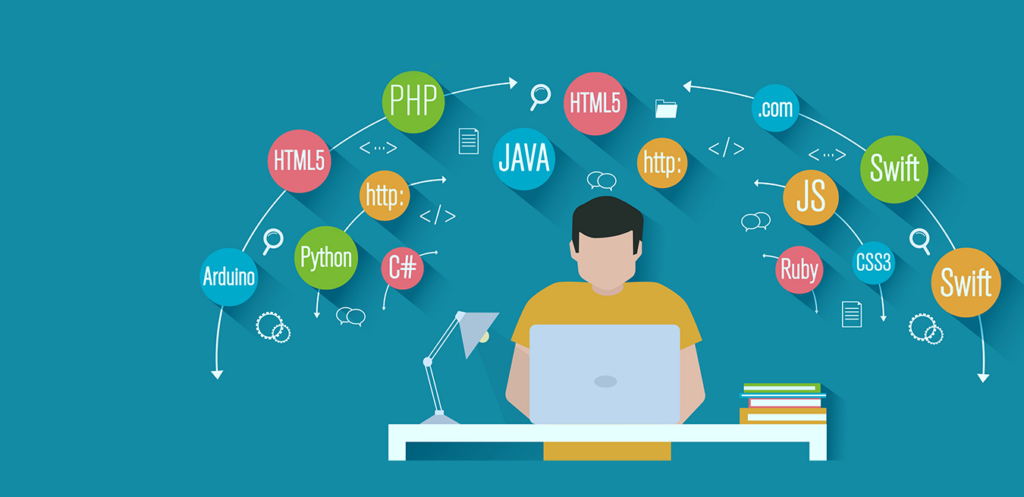5 Best Backend Programming Languages (2024 List)

Are you here to know the Best Backend Programming Languages? If yes, read on till the end.
During the current era, many of our daily tasks involve using computers or smart devices. Whether it’s checking social media or browsing through content, we’re often interacting with various apps. But have you ever wondered how all of this works behind the scenes?
The magic behind these seamless experiences lies in the backend of apps. Backend languages play a crucial role in ensuring that apps function smoothly and deliver excellent user experiences. They’re responsible for building robust backends that manage data processing and storage tasks.
Web development involves both front-end and back-end development. Frontend languages like HTML, CSS, and JavaScript control what users see and interact with on their screens. On the other hand, backend development focuses on the server side, managing the functionality of websites and apps. Learning about backend languages can help you become a well-rounded development professional, capable of building fully functional and user-friendly applications.

What is Backend Development?
Let’s quickly see what backend development is.
Backend development is an important part of making websites and web apps to make them work smoothly. It deals with all the things happening behind the scenes, like managing data and how the server talks to the part of the website you see.
Backend developers take care of the server where the website lives. They set it up, keep it secure, and make sure it runs flawlessly.
They also look after the database that stores all the website’s information. This means they create and organize the database, make sure it works fast, and keep all the data safe.
Plus, backend developers write code to handle things like user requests, making sure only the right people can access certain parts of the website, and making sure everything runs smoothly. They’re basically the wizards behind the curtain, making sure everything works like magic.
Types of Backend Programming Languages
Object-Oriented Programming
This method focuses on organizing information rather than using step-by-step instructions. In this technique, data is stored in specific ways that are unique to functional programming.
Object-oriented programming is great for teamwork on large and complicated projects. PHP, Java, Ruby, and Python are some common examples of backend programming languages that use this approach.
Functional Programming
In FP backend programming, the main focus is on stating facts and getting outcomes, rather than the step-by-step process. It supports working with data that stays the same and doesn’t cause any unexpected changes.
For better efficiency, organization, and solving problems in a simple way, FP is the top choice. SQL, R, Haskell, and F# are some of the best programming languages for FP backend development.
The Best Backend Programming Languages To Learn
1) Java
Java is a flexible programming language that’s great for many different tasks. It has free access and works on any platform. Plus, it has lots of advanced features and is similar to C++, but easier to understand.
Features
Easy to Use:
Java gets rid of the tricky stuff in C++, like overloading operators or pointers.
Secure:
Java turns your code into something really hard to understand, so bad guys can’t mess with it. This keeps your programs safe from viruses or other bad stuff.
Dynamic:
Java can use memory more efficiently, which makes programs run faster and saves space.
2) Python
Python is a popular backend programming language known for its clear syntax and object-oriented design, allowing developers to create applications rapidly.
Features
Easy to Learn:
Python has a simple syntax, making it easy for anyone to learn and use. It’s great for beginners and those switching from other languages because it feels like regular English.
Automation:
Python is famous for its automation abilities, thanks to tons of tools and modules available. It’s super efficient and speedy, especially for things like software testing, where you can write less code but get more complete.
Lots of Libraries:
Python has a big community constantly creating new open-source libraries and helping each other out. This means Python is perfect for pretty much any task you can think of!

3) PHP
PHP, also known as PHP Hypertext Preprocessor, is a widely used open-source server-side programming language. It’s perfect for creating dynamic web pages.
Features
Cybersecurity Champ:
PHP is commonly used in cybersecurity to securely share data between servers and users, boosting security during data transfers.
Versatile Outputs:
PHP can create all sorts of files like PDFs, Flash, and text files without needing extra languages. It’s perfect for building forms, showing dynamic content, and even tracking returning visitors with cookies for targeted marketing.
Easy to Learn:
PHP makes it super easy to reuse code blocks you’ve made, just like HTML. This means it’s simpler to learn compared to other programming languages.
4) NodeJS
Node.js lets you use JavaScript not only on the front end of web apps but also on the back end in serverless setups. This blends frontend and backend technologies, as JavaScript is usually reserved for the client side of web apps.
Features
Blazing Speed: Node.js runs on the Chrome V8 engine, making it super fast at executing JavaScript code. This gives it a speed advantage over other languages like Python and Ruby.
Scalability: Node.js can handle tons of requests all at once. It even has a special module to spread the workload evenly across all the CPU cores in your computer.
Compatibility Criteria: Node.js works on pretty much any operating system you can think of, from Unix and Linux to Windows and macOS X. Plus, it can even run on mobile devices! And if you need to, you can package up your Node.js app into a standalone executable for easy distribution.
5) SQL
Structured Query Language (SQL) handles relational databases, which organize data points in a connected manner. Data can be stored in an SQL table and easily accessed or modified.
Features
Centralized Database Control:
With SQL Server, database control is right there in the program itself. This means there’s less chance of data getting messed up or errors happening when loading data.
Data Recovery and Restore:
SQL Server comes with handy tools for recovering and restoring data. So if something goes wrong with your database, programmers and developers can use these features to fix it.
Top-notch Security:
Microsoft SQL Server is known for its strong security features and great data protection management. So your data stays safe and sound, even against potential threats.

Conclusion – Best Backend Languages
Above, we’ve listed the best backend programming languages that you might want to learn. However, remember to consider factors like your goals, project needs, and learning ease before choosing one. These are the best backend languages that require the logical mind to untangle complexities.
If you’re gearing up for a job interview or want to boost your skills in the tech world, join ToolDart. We are offering a full-stack development course where you will learn both frontend and backend from scratch. Not only this, we also give a 100% job guarantee upon the completion of the course.
Connect with us now to start your journey!




